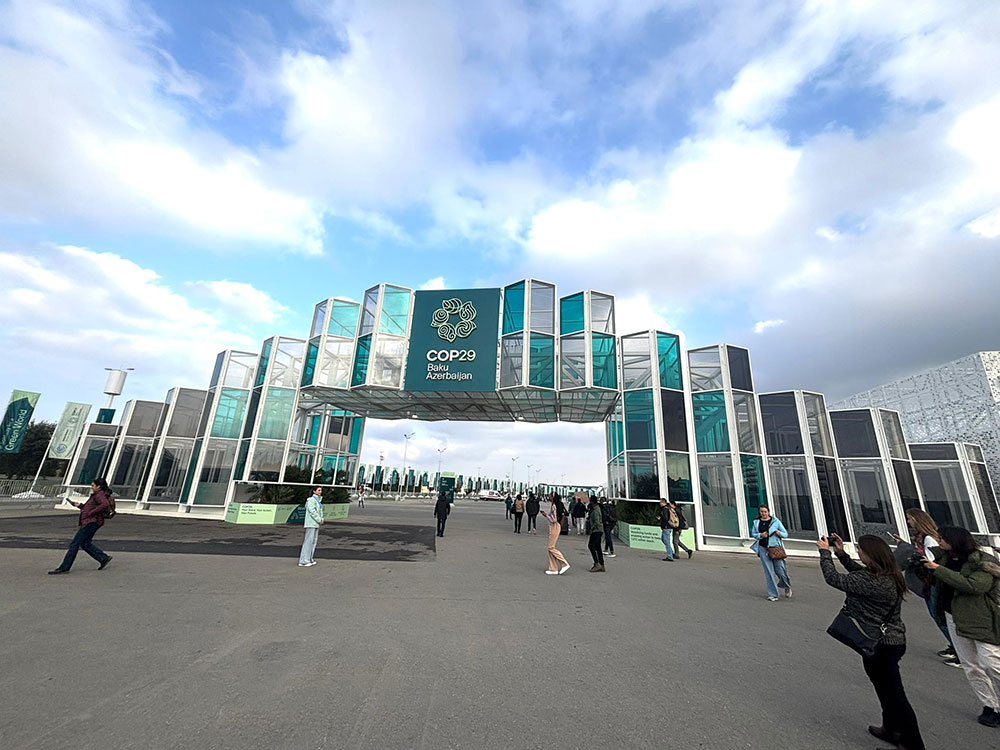Around 15 members of Bhutanese delegation are participating in key negotiation tracks at COP 29 to ensure Bhutan’s climate priorities are addressed
Yangyel Lhaden
Baku, Azerbaijan—As the 29th Conference of the Parties (COP29) unfolds, Bhutan’s delegation is making their mark in the critical negotiations.
As a small, climate-vulnerable nation, the delegation is working to ensure Bhutan’s unique challenges are recognised and to secure support for adaptation, resilience initiatives, and access to climate finance, while raising the country’s voice on the global stage.
Dubbed the “Finance COP”, this year’s conference is expected to make major strides in climate finance, with the primary goal of establishing a new target to replace the expired USD 100 billion annual climate finance pledge.
The new framework, the New Collective Quantified Goal (NCQG), aims to surpass the previous target, ensuring developing nations have the financial resources they need to tackle the escalating climate crisis fuelled by a global temperature rise showing no sign of slowing.
Bhutan’s participation in COP29 comes after its graduation from the Least Developed Countries (LDC) group to the broader Group of 77 (G77) and China coalition. While this transition broadens Bhutan’s diplomatic reach, it also means the country can no longer rely on direct support through representation with LDC—a shift that reduces its negotiating influence compared to its previous, more focused role within the LDC group.
Despite this shift, the Bhutanese delegation, led by secretary of the Ministry of Energy and Natural Resources (MoENR), Karma Tshering, are participating in key negotiation tracks to ensure Bhutan’s climate priorities are addressed.
One key issue being discussed is the NCQG on climate finance, which aims to provide additional, easily accessible climate finance, with grant-based funding for adaptation, loss and damage, and highly concessional financing for mitigation.
“The key discussion is around climate finance to be non-debt as grant-based climate finance is important for Bhutan to be able to adapt and build resilience to climate change and support ongoing transformation efforts,” Karma Tshering said.
At COP28 last year, mountains were included in the Global Goal on Adaptation (GGA), and Bhutan has submitted 39 mountain and well-being-specific indicators. “We hope to maximise the benefits from the GGA and secure most, if not all, of the 39 indicators adopted in the final decision text,” the MoENR secretary said.
In May, Bhutan hosted a successful workshop under the UAE-Balem Work Programme on mountain indicators in Thimphu, raising awareness on the importance of adaptation financing for Bhutan’s unique mountain ecosystems, Karma Tshering said.
At COP29, negotiations are also taking place under Article 6 of the Paris Agreement on international carbon markets, covering both market-based and non-market approaches.
In the first day of negotiations, standards for mechanism methodology development including removal activities were adopted by countries and so far, is the first breakthrough for COP 29.
“Other crunchy technical issues on carbon markets such as authorisation and registries will be discussed in the coming days,” Karma Tshering said.
Following the establishment of the Loss and Damage Fund at COP28, parties are providing guidance on its operationalisation, including eligibility criteria. “Bhutan will negotiate to ensure that our vulnerabilities and unique circumstances as a mountainous country are considered in the Loss and Damage Fund,” Karma Tshering said.
Bhutan will also participate in the review of the Warsaw International Mechanism (WIM), which has been criticised for its low ambition, and push for the publication of loss and damage reports, he added.
The WIM, established at COP19 in 2013, addresses climate impacts that cannot be mitigated or adapted to. It focuses on providing support to vulnerable countries in the areas of finance, insurance, and risk reduction to help nations cope with the loss and damage caused by extreme weather events and long-term climate impacts.
Bhutan is closely monitoring the Mitigation Work Programme launched at COP26, which aims to scale up global mitigation ambition to help achieve the 1.5 degree Celsius target.
“Bhutan will participate in this forum to ensure our development policies align with this goal while considering our national circumstances are not compromised,” Karma Tshering said.
Other engagement of Bhutanese delegation includes discussions on the modalities for a new dialogue on implementing the Global Stocktake (GST) outcomes, the final review of the Lima Work Programme on Gender, and potential refinements to the procedural and logistical elements of the GST process, among others.
This story is produced as part of the COP29 Climate Change Media Partnership, a journalism fellowship organised by Internews’ Earth Journalism Network and the Stanley Center for Peace and Security


